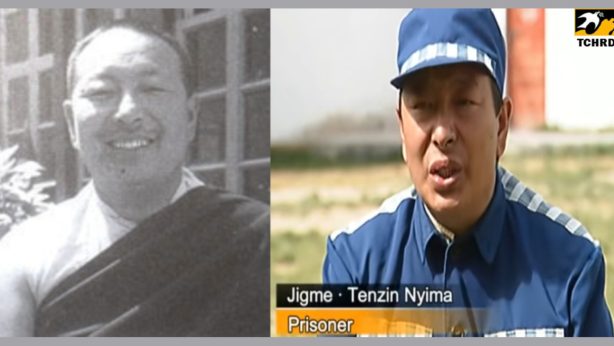TCHRD Condemns the China framing of Tulku Phurbu Tsering Rinpoche on weapon charges
The Tibetan Centre for Human Rights and Democracy (TCHRD) condemns in strongest terms the framing of Tulku Phurbu Tsering Rinpoche on weapon charges related to last year’s peaceful protests in Kardze (Ch: Ganzi). This is the first known case of senior Buddhist leader being tried in court with a serious charge linked to last year’s demonstration.
A highly revered religious figure of Kardze, Phurbu Tsering Rinpoche, 52, who headed Pangri and Ya-tseg Nunneries in Kardze was accused of ‘illegally possessing weapons’, his Beijing based lawyer Li Fangping was quoted as saying to the Associated Press (AP) in a telephone interview on Tuesday. Rinpoche could face imprisonment for up to 15 years if found guilty by the Kardze Prefecture Intermediate People’s Court.
There is information coming out from the area that security forces were stepped up in the area during the trial yesterday and no verdict has yet been reached following the court trial. Tulku was reportedly tortured for four days and nights upon detention and forced into making a confession after a police interrogation. Police even threatened his wife and son of detention if Tulku did not comply, according to his lawyer as cited by the AP report.
Tulku Phurbu Tsering Rinpoche is a highly regarded reincarnated Tulku (Living Buddha) of Tehor Kardze Monastery in Kardze County, Kardze “Tibetan Autonomous Prefecture” (‘TAP’), Sichuan Province. He is the chief spiritual preceptor and the head of Pangri and Ya-tseg Nunneries in Kardze. A charismatic figure who was a source of inspiration and hope had constructed an old age orphanage and opened two chemist shops for the local Tibetans.
It is appalling and condemnable that a prominent and revered religious figure of Kardze who had been arbitrarily detained for nearly a year is framed on untenable charge. The tactic employed by China is not a new one, rather it serves as a dark reminder of her persistent vilification and demonizing campaign against the prominent religious figures inside Tibet who have been viewed as a direct challenge to their authority. In addition, Chinese authorities in order to give a different dimension to the mostly peaceful protests last year are distorting facts with fabricated evidence extracted through torture so as to label the prominent religious leader as someone instigating violence and that is something the authorities had been working so hard over the past months. Such acts are disparagingly worrisome as numerous human rights are violated in the process.
In the past, many of prominent Tibetan religious figures such as Khenpo Jigme Phuntsok of famed Sertha Buddhist Institute, Geshe Sonam Phuntsok of Dargay Monastery in Kardze, Tulku Tenzin Delek Rinpoche, the founder of Kham Nalanda Monastery, who championed the welfare of Tibetan people and Bangri Rinpoche, the founder of Gyatso orphanage in Lhasa were all arrested under false and fabricated charges. Many of them are serving lengthy prison sentences whereas few have passed away after their release.
Tulku Phurbu Tsering Rinpoche was arrested by Chinese security forces in the early morning raid at his home on 18 May 2008, just days after more than 80 nuns of Pangri Nunnery held a peaceful demonstration voicing their distress at the Chinese authorities’ crackdown, killing, torture and arrest of peaceful Tibetan protesters in many parts of Tibet as well as resentment against the forced implementation of the “patriotic re-education” campaign, forcing Tibetans to sign official documents that criticize, denounce and attack the Dalai Lama. Following the protest 55 nuns of the Pangri Nunnery were arrested. Many were severely beaten by the security forces at the site of the demonstration before being bundled away in military trucks. The current situation in Kardze is known to be very tense following court trial of Tulku yesterday.
China has a long and reprehensive history of gross human rights violations abetted by a political culture of impunity towards perpetrators of human rights violations. The torture and ill treatment are endemic in the wide network of prisons and detention centers across the Tibetan plateau. Torture, cruel, inhuman or degrading treatment appears to have become a central element of state agents’ treatment of Tibetans perceived as being in opposition to the Communist regime and those attempting to exercise their rights to freedom of association, peaceful assembly and expression and case of Tulku here clearly highlights such heinous practice being employed by the Chinese authorities despite PRC signing and ratification of UN Convention Against Torture (CAT). TCHRD notes that, Chinese Public Security Bureau (PSB) and People’s Armed Police (PAP) are repeatedly using torture as a means of intimidating, investigating and extracting information or confessions from real or perceived offenders and detainees.
The government of the People’s Republic of China (PRC) practice of using coerced confessions through torture to establish detainees’ guilt is great cause of concern and should be subjected to serious international scrutiny. The Centre calls for urgent intervention in this case by the relevant UN bodies and the international community.

